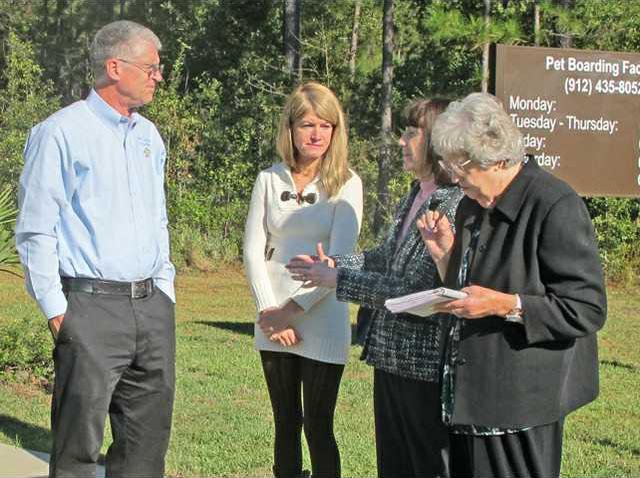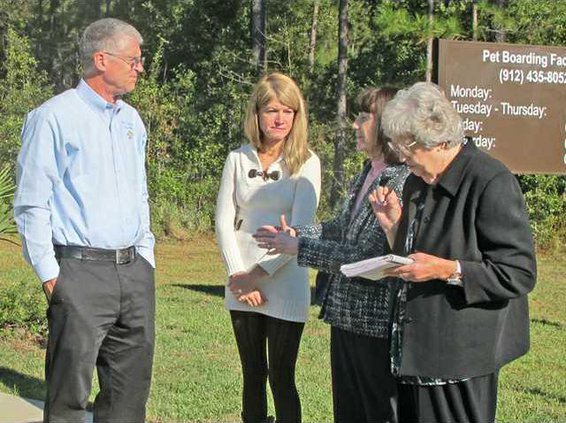Hinesville’s Morning Glory Garden Club received help Thursday morning from the state’s expert gardener. Walter Reeves, a.k.a, the Georgia Gardener, agreed to advise the garden club ladies about a special project they’re working on at Fort Stewart’s Pet Grooming
Facility.
Reeves met with garden-club members at the facility at the Holbrook Recreation Area. Club President Judy Shippey, along with Carol Ann Blauvelt and Jill Anderson, met Reeves at the facility’s entrance. They were joined by the facility’s manager, Cindie Rigdon.
“We asked him to come out because the Morning Glory Garden Club has taken the beautification of the Pet Boarding Facility grounds as a project,” Shippey said. “We needed his advice as to what to plant that is nontoxic to dogs and is not harmed by uric acid.”
Reeves, who has authored nine books, hosted television and radio shows about gardening and landscaping, writes a newspaper column and maintains a website (www.walterreeves.com), responded to a question about why he is called the Georgia Gardener. He smiled and said he knows a lot about gardening, and he lives in Georgia.
Although he earned a bachelor of science in chemistry from the University of Georgia in 1973, Reeves said nearly all of his knowledge and skills about gardening and landscaping come from his experience growing up on his family farm in Fayette County, southwest of Atlanta, where he lives today. He was the oldest of five children, who early on were expected to help out around the farm and vegetable garden, and care for the cows and chickens they raised.
“I trained on a farm from the time I was 5 or 6 years old,” Reeves said. “My daddy said, ‘Boy, get out there and plant them t’maters.’ We lived in the country. In fact, we didn’t have an indoor toilet until I was 12 years old. When I went off to college, I couldn’t wait to get away from that farm and wanted nothing to do with farming or gardening.”
After college, Reeves said began what would become a 30-year career with the University of Georgia Agricultural Extension. He was working with horticulture graduates and soon discovered he knew more about horticulture than they’d learned in a college classroom. That position led him to radio in 1985 when a local station asked for extension agents to respond to gardening questions on a Saturday morning radio show.
Looking back, Reeves said a 4-H project that had to be reported in front of his class confirmed to him he could do talk radio or TV.
“I figured if I can do it for five minutes in the fourth grade, I can do it for a living,” said Reeves, who broke off his next sentence, bent down and began digging in some cypress mulch.
He stood up and opened his hand, brandishing a June bug that he offered to a garden club member. He suggested releasing the bug well away from where the dogs might try to eat it. As the rescued bug was escorted to the wood line, Reeves was greeted by a pair of “doggy day-care” clients, Maddison, a female Labrador retriever that Rigdon said was a rescue dog, and Calie, a female mixed breed.
As Reeves squatted to pet and talk with the dogs, Rigdon reiterated that whatever was planted as part of the beautification project had to be “dog-friendly and urine-friendly.”
Reeves said he had planned to suggest a low-maintenance perennial called lantana, which is hardy enough to withstand “canine watering,” but he learned it’s toxic to dogs. Instead, he made several other plant suggestions and mentioned landscaping techniques the garden club might use. Anderson said Reeves’ insight and suggestions are a great help to their club, and members thanked him for his advice.
Georgia Gardner advises garden club


Sign up for our e-newsletters